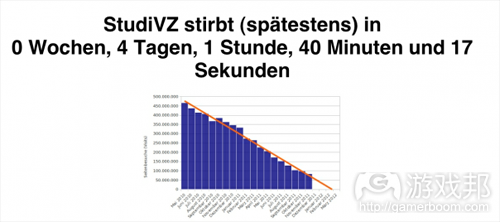每日观察:关注德国第一社交网站StudiVZ裁员(6.9)
1)据Business Insider报道,EA在今年的E3展会推广新款Facebook游戏《模拟城市社交版》时,没有一名社交游戏工作室Playfish高管出席该活动。有观察者猜测,这一迹象或许表明EA之前投入4亿美元收购的Playfish已经没有多少剩余价值。
而该游戏亮相前数周,前Playfish开发主管Catharina Lavers Mallet则跳槽到另一家社交游戏公司King.com;之前还有传闻称EA将缩小Playfish规模,虽然EA否认这种说法,并声称Playfish推出的《模拟人生社交版》仍是“EA头号社交游戏”,但有知情者透露,该游戏目前已由Playfish印度工作室接管,而EA也在今年5月宣布关闭Playfish在挪威特罗姆瑟工作室并裁员21人。
2)DFC Intelligence报道,2011年全球所有平台的电子游戏软件(游戏邦注:包括掌机、PC、网页和移动领域)收益为520亿美元,预计2017年将达700亿美元。
尽管休闲游戏用户规模发展迅速,但12-30岁的男性“核心玩家”才是游戏产业收益增长的主要动力;此外,数字渠道也增加了全球核心玩家获取新产品的途径,并极大推动了整个产业的发展,预计2017年数字发行游戏收益将占比66%(约462亿美元)。
PC游戏将是最主要收益增长来源,预计占比39%(273亿美元),而掌机游戏软件则占比36%(252亿美元),手机游戏占比25%(175亿美元)。
DFC引用Xfire数据指出,《英雄联盟》、《暗黑破坏神3》以及《挖矿争霸》尽管未推出零售产品,但却能够吸引100万左右的日活跃用户,而Facebook之类的社交及网页游戏对核心玩家来说仍然相对缺乏吸引力。
3)据insidesocialgames报道,社交游戏开发商Kixeye首席执行官Will Harbin在最近采访中表示,公司将推出自己的非Facebook游戏平台,用户无需拥有Facebook帐号就可在该平台玩游戏。据其所称,这个平台实际上是为那些与Facebook无关的玩家而设计,玩家可以让自己的帐号与Facebook相绑定,但这个平台并不完全依赖Facebook Connect功能。
他还指出,这并不意味着Kixeye要放弃Facebook,只是意在通过新平台方便那些不想在Facebook玩游戏的用户,但并不打算借新平台推出第三方游戏发行服务,原因是他认为目前的网页游戏质量都不够高。
Harbin还表示,公司最近与Mobage合作推出的手机版《Backyard Monsters》是Kixeye试水移动领域的一个举措,如果这款游戏运营良好,他们就会投入更多手机游戏开发资源,但他认为这个目标可能难以实现,因为Kixeye游戏主要针对大屏幕而设计。
他还指出Kixeye不会效仿EA、Zynga等公司进军中国的做法,因为中国市场形势很复杂,运营环境并不理想。Kixeye计划再推出20款游戏,其中有3款已经投入开发,有一款奇幻主题的角色扮演游戏计划于9月发布。
4)据Venture Village报道,曾在4年前拒绝Facebook收购要约的德国社交网站StudiVZ最近陷入困境,承认已裁员25名开发人员,并将进行一轮业务重组。
该网站由几个学生于2005年创办,后来迅速成长为德国最大社交网站,但已经有一段时间的流量急剧下滑,去年夏天重新发布后仍难挽颓势。该网站目前持有者是Holtzbrinck Digital公司,它在2007年出价8500万欧元(1.07亿美元)收购了StudiVZ。
5)据KPCB合伙人Mary Meeker最近数据显示,每名Zynga手机游戏用户年均创造收益仅为5美元,远逊于其桌面电脑游戏用户所创收益(平均为25美元),Zynga目前难以在手机游戏市场实现可观收益。
6)Zynga最近通过博客宣布推出第5个《FarmVille》扩展内容《FarmVille Jade Falls》,该游戏采用了梯田、熊猫和龙等东方元素,目前已经在Facebook上线。(本文为游戏邦/gamerboom.com编译,拒绝任何不保留版权的转载,如需转载请联系:游戏邦)
1)EA’s social star Playfish ‘out of juice’ after E3 no-show
by Keith Andrew
With a claim that “EA does not get social”, Business Insider has branded an apparent no-show by the publisher’s social studio Playfish at E3 as the final nail in the developer’s coffin.
The website claims EA’s decision to showcase Playfish’s SimCity for Facebook at the event without the hand of any executives from the developer a sign its $400 million acquisition of the firm back in 2010 was a dud.
Fish out of water
“Playfish just doesn’t have much juice left,” details Business Insider’s Matt Lynley.
“The utter lack of attention to its prized studio during what is supposed to be the launch of one of its biggest social games ever is basically the final nail in Playfish’s coffin.”
The game’s unveiling came a matter of weeks after former Playfish development director Catharina Lavers Mallet let her position at the studio to take up a job at rival social outfit King.com.
Socially speaking
EA’s unlikely to share such a pessimistic view, however.
While rumours have suggested the publisher was looking to downsize Playfish ever since it was acquired, chatter just weeks before E3 has claimed the firm’s The Sims Social for Facebook was “on life support.”
That’s an assertion EA described as “misinformed” in a statement to VentureBeat, with the game serving as “EA’s top social game.”
An unnamed source, again cited by Business Insider, has suggested Playfish India – which was behind The Sims Social – was “just going to keep the lights on.”
EA also reportedly closed Playfish’s studio in Tromso, Norway, back in May, with 21 jobs lost.(source:pocketgamer)
2)Core gamers to grow game industry revenues to $70B by 2017 – analyst
by Eric Caoili
Revenues for video game software around th world and across all platforms — console, PC, web, and mobile — will grow from $52 billion in 2011 to $70 billion in 2017, according to new a study.
Market research firm DFC Intelligence admits that new and casual audiences are expanding the industry, but it argues that “core gamers,” or male consumers aged 12 to 30 years old, will drive that revenue growth as access and monetization capabilities for that demographic improve.
“Digital distribution, already widely accepted among core gamers globally, is clearly broadening access to products and driving much of the industry growth,” says DFC Intelligence CEO David Cole. He expects digitally distributed games to make up 66 percent (46.2 billion) of the game industry’s revenues by 2017.
DFC Intelligence also notes that games played on PCs will make up most of that revenue growth, as much as 39 percent (27.3 billion), compared to 36 percent (25.2 billion) for console software and 25 percent for mobile titles (17.5 billion).
The company worked with firms like Xfire, Live Gamer, GamerDNA for the past five years for its study, using data from their respective services for its analysis of global consumer behaviors.
Underlining the importance of digital distribution for core audiences, DFC says the three most popular PC titles in the West according to Xfire — League of Legends, Diablo III, and Minecraft — managed to consistently attract as many as one million active daily users despite having little to no retail presence.
The firm also adds that browser and social games need to appeal to core gamers in order to grow its revenues. “The bottom line is core gamers spend money on products they like and right now the game offerings on sites like Facebook are simply not appealing to that demographics,” says Cole.(source:gamasutra)
3)Will Harbin opens up about Kixeye’s new platform, future plans, refusal to go to China
Mike Thompson
The first half of 2012 has been big for social game developer Kixeye: It’s claiming record revenues, its flagship social strategy game Backyard Monsters celebrated its second birthday in March and it recently resurrected 3 Blokes Studios after RockYou shut the developer down. According to CEO Will Harbin, though, this is just the start of things to come for Kixeye between launching a new web platform, entry into mobile and new games.
Kixeye’s platform will be the developer’s first big off-Facebook step since committing itself to a Facebook only strategy last year. Harbin tells us that the new platform won’t even require a Facebook account to play games. In fact, he says, the platform is designed “primarily for gamers who don’t want to have anything to do with Facebook. You can use Facebook to connect your account, but we’re not taking full advantage of Facebook Connect.”
“That’s not to say we’re going to be going away from Facebook,” he continues. “We’re still … going along with Facebook. There’s a segment of gamers who refuse to play games on Facebook because when they think of Facebook they think FarmVille or, you know, stalking ex-girlfriends.”
While other developers launching their own platform have decided to supplement their income by publishing third-party games, Harbin says there aren’t any plans to use Kixeye’s portal for third-party titles. Competition from established publishers like 6waves aside, the main reason Kixeye hasn’t gone into publishing yet is because the company hasn’t found any games of high enough quality.
“Unfortunately, there’s not a lot [of quality games] in the browser space,” Harbin explains. “Honestly, there hasn’t been a single title that we’ve found that we’d take as is and put our brand on it.”
Meanwhile, Kixeye is testing the mobile market, but isn’t committing to anything yet. Harbin describes the company’s recent partnership with Mobage to bring Backyard Monsters to mobile devices as an experiment. He says that if the game does well, Kixeye will do more with mobile development but acknowledges this deal may not work simply because “our games are designed to be played on a big screen.”
In spite of Kixeyes’s moves to expand its audience, Harbin says Kixeye isn’t following rivals like EA and Zynga as they move into China.
“China’s filled with crooks,” he asserts. “We’ve had lots of discussions with Chinese companies and they all try to screw you. It’s a shady business environment over there. We don’t have to have China to be a big business. It’s honestly too frustrating.”
Looking forward, Kixeye’s roadmap includes 20 games — three of which are actively in development now. The developer is also staffing up for a fourth; Kixeye has raised some eyebrows in San Francisco with prominent ads on local transit systems that tap into various hardcore gamer cultural memes (see below for a recent example).
Harbin isn’t willing to say much about the new games yet, but the first of them — a fantasy-themed role-playing game with multiplayer battles — is due out in September. This RPG will feature full 3D graphics and be used as an introduction to the following titles, which are due out this Fall and Winter. Kixeye also has plans for a full-fledged MMO, which won’t launch for around a year after these three games.(source:insidesocialgames)
4)Crushed by Facebook, StudiVZ teeters on the brink
By Bobbie Johnson
Four years after it turned down a buyout offer from Facebook, reports suggest that German social network StudiVZ faces a radical, life-saving revamp — or even closure.
The site, which was started by a couple of students in 2005 and counted the Samwer brothers as early investors, quickly grew to become Germany’s largest social networking service but it has been in trouble for some time. With rapidly declining traffic and a relaunch last summer that failed to end its difficulties, there has been a succession of rumors circulating about the site’s future under current owner Holtzbrinck Digital, which bought the site for €85 million ($107 million) in 2007.
But now evidence is slowly trickling in to suggest things are reaching a critical point.
According to Gruenderszene, 20 of the site’s 70 staff have left in recent weeks — though whether they went of their own accord or were fired is not yet clear. And that comes ahead of another redesign planned this summer by the current owners, Holtzbrinck Digital.
And at the same time, traffic is continuing to hemorrhage: single-serving website wannstirbtstudivz (“When does StudiVZ die?”) had been tracking the site’s declining traffic, with the prediction that the site would close this spring. Although it’s recently been taken down, the graph tells its own story.
And while anecdotal evidence may never be entirely accurate, this kind of feedback from users is not good, either:
@bobbiejohnson I still have my profile, but I haven’t been there since months (years?). The same for all my friends. Everyone is on FB.
— Robert Freudenreich (@robfreudenreich) June 7, 2012
@bobbiejohnson @superglaze I do not know anyone who is actively using StudiVZ any more. Deleted my account a month ago because of that.
— Jonathan Gebauer (@jogebauer) June 7, 2012
I’ve contacted StudiVZ for comment on the reported job losses, but the company has yet to respond.
Whatever the case, it’s a torrid state of affairs — and a long way from where the company once was.
Back in early 2008, Holtzbrinck reportedly turned down an acquisition offer from Facebook because they were holding out for more money. What seemed like a bluff in fact turned out to be very dangerous: Facebook followed its failure to purchase by launching a number of lawsuits against the company for cloning, and though it didn’t really get very far it tied the German company in knots: while StudiVZ was embroiled in legal concerns, Facebook’s growth team were pushing hard with a very hungry and very smart international expansion.
As Berlin startup blog Venture Village points out, when Facebook overtook StudiVZ the end seemed to be in sight — and the entire affair leaves Holtzbrinck looking very tired while the Samwer brothers sit pretty.
Without the hustle of the original investors the Samwer brothers on board, it almost seems that Holtzbrinck is having more difficulty than ever making successful exits. The three brothers are likely to enjoy themselves even more knowing that they realised their own early exit from StudiVZ successfully.
It’s always easy to look back and wonder what if… but in retrospect, rejecting Facebook’s advances looks like a very, very poor decision.
Update, June 8: It seems the rumors were correct. According to Venture Village, Holtzbrinck has confirmed that 25 development staff were laid off and the rest are to be moved elsewhere in the umbrella company as it undergoes another restructuring.(source:gigaom)
5)Zynga may be struggling to get mobile development to pay off — Zynga’s made a concentrated effort to branch out from Facebook games and develop for mobile phones, but an independent account claims this move may not be working out as hoped for. Mary Meeker’s recent State of the Internet presentation estimates Zynga is seeing an annual average revenue of $5 per mobile user (as opposed to $25 per user on desktop computers).(source:insidesocialgames)
6)FarmVille gets Asian-inspired expansion — Zynga’s fifth expansion for FarmVille, FarmVille Jade Falls was announced this week. According to the Zynga blog, expansion includes terraced farming, new buildings, crops and animals (including panda bears and dragons). The expansion is now live on Facebook.(source: insidesocialgames)












































 闽公网安备35020302001549号
闽公网安备35020302001549号